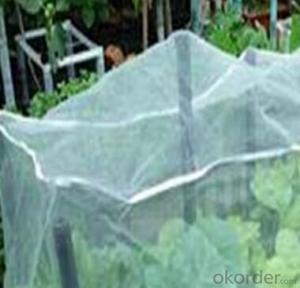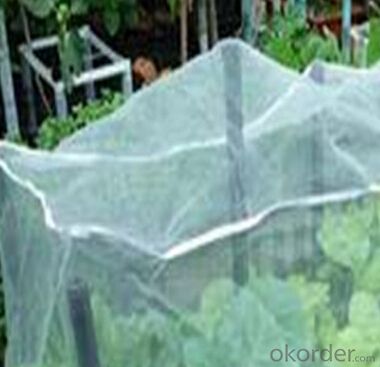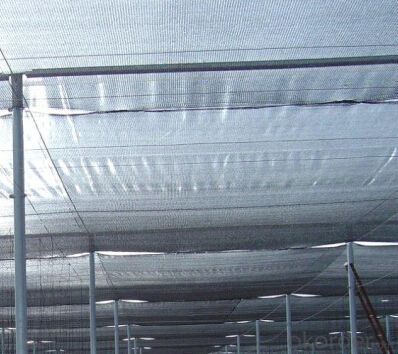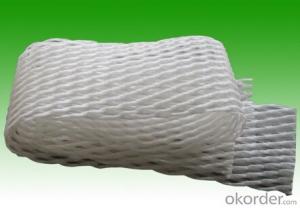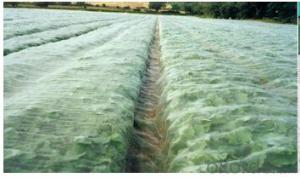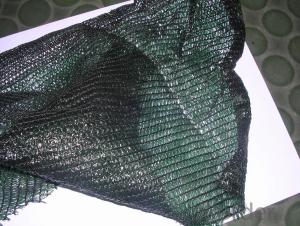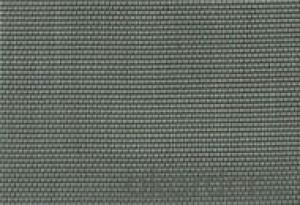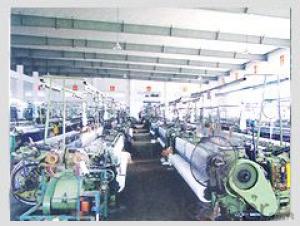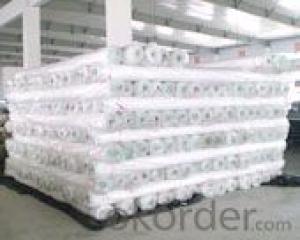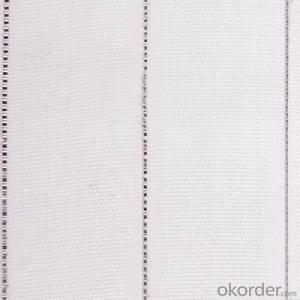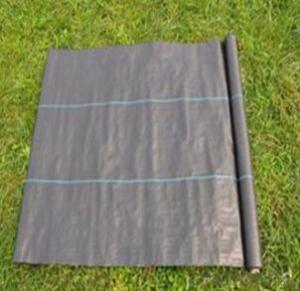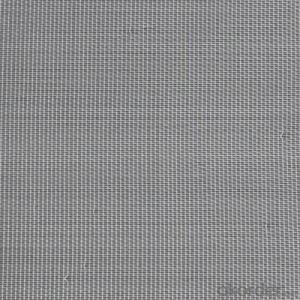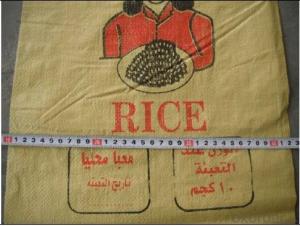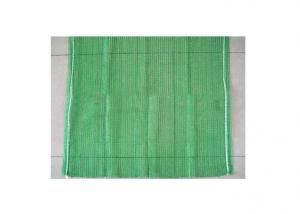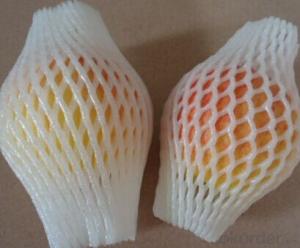Anti-insect Net for Greenhouse with 100% virgin HDPE
- Loading Port:
- Ningbo
- Payment Terms:
- TT OR LC
- Min Order Qty:
- 40000 m²
- Supply Capability:
- 10000000 m²/month
OKorder Service Pledge
OKorder Financial Service
You Might Also Like
Anti-Insect Net
Features:
1.It is manufactured of polyethylene mono-filament UV stabilized yarn.
2.It is a very thick mesh net in order to avoid insect (especially aphids) passage.
3.It is plain weaven, light weight, beautiful generous, acid and alkali, ventilated breathe freely, easily clean, qualitative light,cheap, etc.
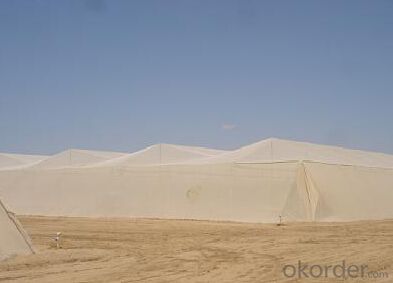
Specifications:
Fabric Weight:120gsm
Uv. Content: 0.3%
Width: 4.2m
Length: 20m, 50m, 100m
Color: White
Minimum life length: 4 years, under normal weather conditions and use.
Applications:
- Being an effective protection against insects like white fly, etc.
- Helping reduce the use of phytosanitary products against insects/plagues.
- Allowing maximum ventilation in hot seasons.
Packing: rolls on cardboard tubes & wrapped in plastic.
FAQ:
1.how many years guaratee about your products?
Using 100% virgin HDPE with UV,which can extend age of the nets for 3-10 years.
2.Can you supply a sample?
Our pleasure to send sample to our clients
3.what's the payment?
Usually our payment term T/T and L/C.
4.Why we choose your products?
Our price is best competitive, we are directly production factory, welcome to visit our fctory.
- Q: I'm 16 would anyof u teens get plastic now? If so what?I had a tummy tuck!
- no. i dont like any teeanger having plastic surgery to change how they are unless its medically related and recommended by your doctor. its kinda pointless because your body is still growing and you might need to go back and get more surgery because some things can get shifted as you grow...plus getting a tummy tuck and lipsuction does not mean anything really. the fat can still come back. you should have just exercised and ate right in the beginning
- Q: How do you water plants in a nursery tray?
- To water plants in a nursery tray, you can gently pour water into the tray until you see it start to drain out from the bottom. This ensures that the plants receive sufficient moisture without overwatering them.
- Q: Can ground cover be used in both sunny and shady areas?
- Yes, ground cover can be used in both sunny and shady areas. There are different types of ground cover plants that are suitable for various light conditions. Some ground cover plants thrive in full sun, while others prefer shade or can tolerate a mix of sun and shade. It is important to choose the appropriate ground cover plants based on the amount of sunlight the specific area receives.
- Q: What are the benefits of using plastic flower pots in horticulture?
- Plastic flower pots offer several benefits in horticulture. Firstly, they are lightweight and easy to handle, making them convenient for moving and rearranging plants. They are also durable and long-lasting, as they do not break or chip easily like clay pots. Plastic pots also have better insulation properties, helping to regulate soil temperature and prevent root damage. Moreover, their non-porous surface reduces water loss through evaporation and provides better moisture retention for plant roots. Lastly, plastic pots are affordable and available in various sizes and designs, offering flexibility and options for different plant types and gardening needs.
- Q: Can plastic surgeons reduce the size of your ears?
- yes. okorder /
- Q: Are there any ground cover plants that are suitable for dry shade?
- Yes, there are several ground cover plants that are suitable for dry shade conditions. Some examples include English ivy, Lamium maculatum, Pachysandra terminalis, Vinca minor, and Ajuga reptans. These plants are known for their ability to tolerate low light and dry soil conditions, making them ideal choices for shady areas with limited moisture.
- Q: What are the benefits of using plastic row covers?
- Plastic row covers offer several benefits in gardening and agriculture. Firstly, they act as a physical barrier, protecting plants from pests, insects, and birds. They can also provide insulation, helping to regulate temperature and protect plants from frost or extreme heat. Additionally, plastic row covers can promote earlier planting and extend the growing season by creating a microclimate that retains heat and moisture. They also help reduce water evaporation, conserve moisture, and protect plants from wind damage. Overall, plastic row covers are a cost-effective and efficient tool for improving plant health, increasing yields, and protecting crops.
- Q: This question asks about the methods employed by farmers to handle waste generated from agricultural plastic products.
- <p>Farmers manage waste from agricultural plastic products through various methods. They often recycle used plastic materials like irrigation pipes, mulch films, and greenhouse covers. Some farmers use mechanical or manual methods to remove plastic residues from the soil. Others may compost biodegradable plastics, although this is less common for traditional plastics. Proper disposal in designated landfills is also practiced. Additionally, some regions have implemented collection programs where farmers return plastic waste to manufacturers for recycling. Education and awareness programs play a crucial role in encouraging proper waste management practices among farmers.</p>
- Q: Are nursery trays suitable for ground cover plants?
- Yes, nursery trays are suitable for ground cover plants. They provide a convenient way to propagate and initially grow ground cover plants before transplanting them into the ground. The trays help in maintaining the proper growth conditions for the plants, such as soil moisture and temperature, while also allowing for easy transportation and handling.
- Q: I am painting my cousins plastic trunk before she goes off to camp. I outlined everything in pencil and I was wondering what kind of paint I should use so it doesn't chip off the trunk? The trunk is pink and plastic, the surface is rough as well. Any ideas?
- I okorder / There are instructions on the can for preparing the plastic for best adhesion of the paint. If you're looking for paints to paint with using small brushes, etc., though, you can use various paints on top of their dried primer or on top of any color of their plastic paint. Or perhaps glass paints would stick to rough plastic (but I think they're usually translucent?), etc. For using *directly* on the plastic though, you'd need to watch out for using paints with petroleum solvents in them (some are called enamels) if you didn't seal/prime the surface first because those can begin to dissolve the plastic over time--making it sticky, then eventually melty and yukky. Since you've *already* marked the pattern, using a spray paint will be more difficult, though you could mask off areas around your lines perhaps as part of the solution. Or you could trace your lines onto netting or that very-thin-see-through pattern-making sheeting from the fabric store, then redraw the pattern onto the trunk after applying and drying the plastic paint or primer (right through the netting or sheeting). Or you could use one of the other transfer methods that use graphite pencils, or transfer papers (like those for drafting or for sewing), etc. HTH, Diane B.
Send your message to us
Anti-insect Net for Greenhouse with 100% virgin HDPE
- Loading Port:
- Ningbo
- Payment Terms:
- TT OR LC
- Min Order Qty:
- 40000 m²
- Supply Capability:
- 10000000 m²/month
OKorder Service Pledge
OKorder Financial Service
Similar products
Hot products
Hot Searches
Related keywords
